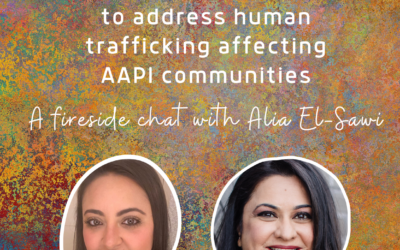Outreach and intervention strategies by Asian and Pacific Islander (API) advocates have arisen as accommodations and alternatives to non-API domestic violence programs. Innovative strategies have been crafted out of necessity and by vision and intention. The ideas provided have been compiled from the brilliant and hard work done by Asian and Pacific Islander advocates and organizations across the country. We have listed strategies very briefly – some of them are used by one agency, some by several.
Related Resources
PowerfuL Partnerships: Collaborative efforts to address human trafficking affecting AAPI communities, 2022
Alia El-Sawi, a Victim Assistance Specialist at the Department of Homeland Security, joins API-GBV for our first “fireside chat” hosted by our Executive Director Monica Khant. Drawing also from her previous role as the Anti-Human Trafficking Coordinator at a community-based organization that provides culturally-responsive services for survivors of human trafficking, Alia will discuss what can be done to increase coordination and communication between DHS agents and community-based advocates in responding to trafficking situations and minimizing trauma for survivors. The conversation will also illuminate challenges to current anti-trafficking efforts, including fear of reporting, human-trafficking’s concurrence with other forms of gender-based violence, and the abundant stereotypes around the trafficking of AAPI individuals.
Faithful Allies: Working with Christian Leaders
This tipsheet 1-pager, developed by Korean American Family Services (KFAM) describes some suggested practices for working with faith leaders on DV/SV response and prevention.
Faithful Allies: Working with Christian Leaders
Almost 70-80% of Korean immigrants in the U.S. reports that they attend church regularly. Korean American Family Services (KFAM) has encountered so many survivors whose faith play a very important role for their journey to healing. Because of this reason, KFAM has been working with the Korean faith community for about 8 years in order to make our community more welcoming to survivors and to train faith leaders to become supportive first responders. Through this webinar, KFAM will share our work with faith leaders, our strategy and the impact of our work.
Trauma-Informed Care for AAPI Survivors: 3-Part Webinar Series
Presented in collaboration with four AAPI community organizations and shelters, this webinar series explores the impacts of trauma on AAPI survivors and communities. Presenters share insight about working with survivors in shelter and through immigration and legal cases; and discuss best practices for providing culturally-specific, trauma-informed services, particularly within the context of COVID-19.




